Leadership, Operations, and Management in the TESCO Context
VerifiedAdded on 2020/10/22
|16
|5043
|78
Report
AI Summary
This report provides a comprehensive analysis of leadership and management principles within the context of TESCO, a British multinational grocery company. It begins by differentiating between the roles and characteristics of leaders and managers, highlighting their similarities and differences, and discussing the importance of effective communication and risk-taking. The report then delves into the functions of a manager as defined by Fayol, including planning, organizing, commanding, coordinating, and controlling. Furthermore, it examines various leadership styles, such as situational, systems, and contingency leadership, using scenarios relevant to TESCO's operations. The report also explores different approaches to operations management, the role of a store manager, and the significance of operations management within TESCO. Finally, it identifies key external factors impacting TESCO's operations and analyzes their influence on managerial decision-making.
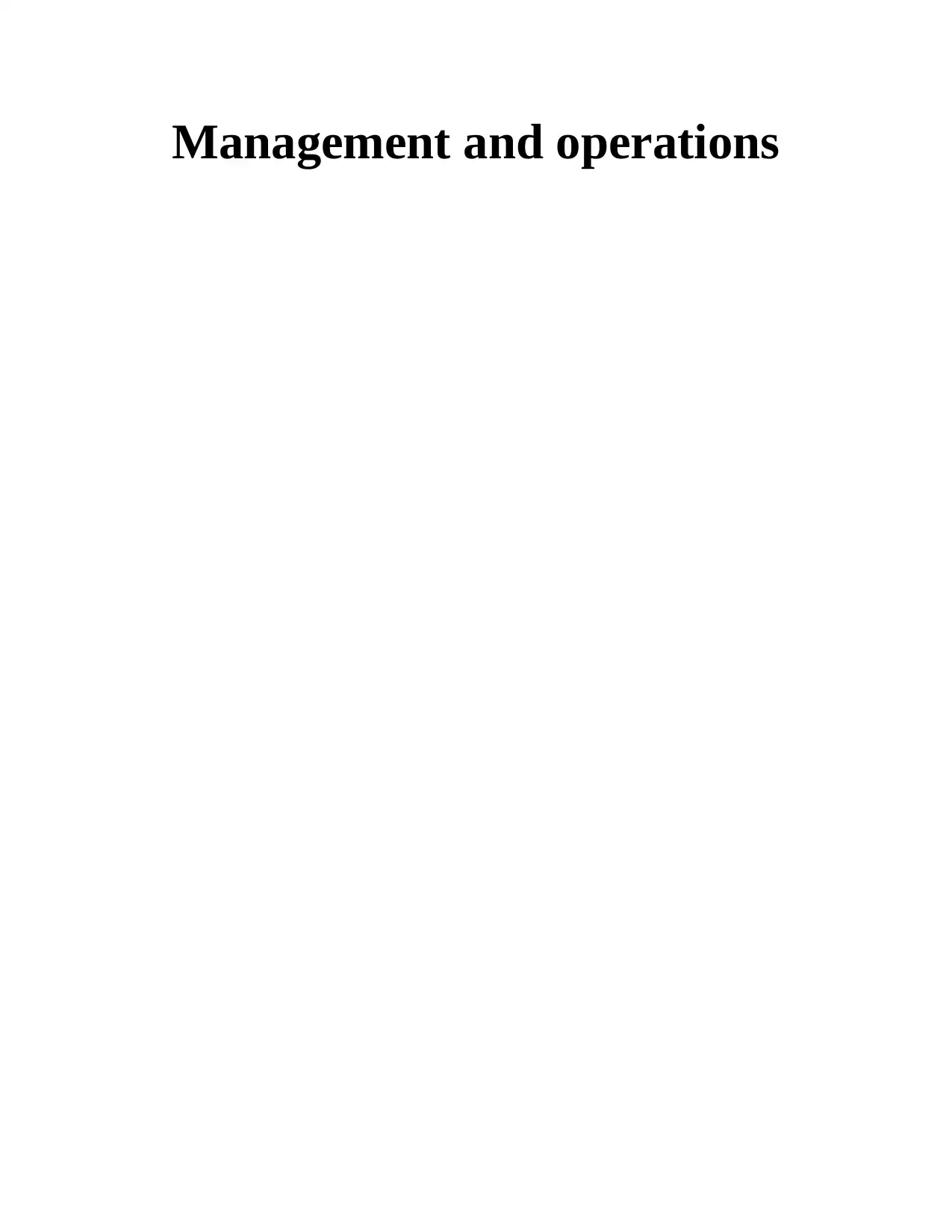
Management and operations
Paraphrase This Document
Need a fresh take? Get an instant paraphrase of this document with our AI Paraphraser
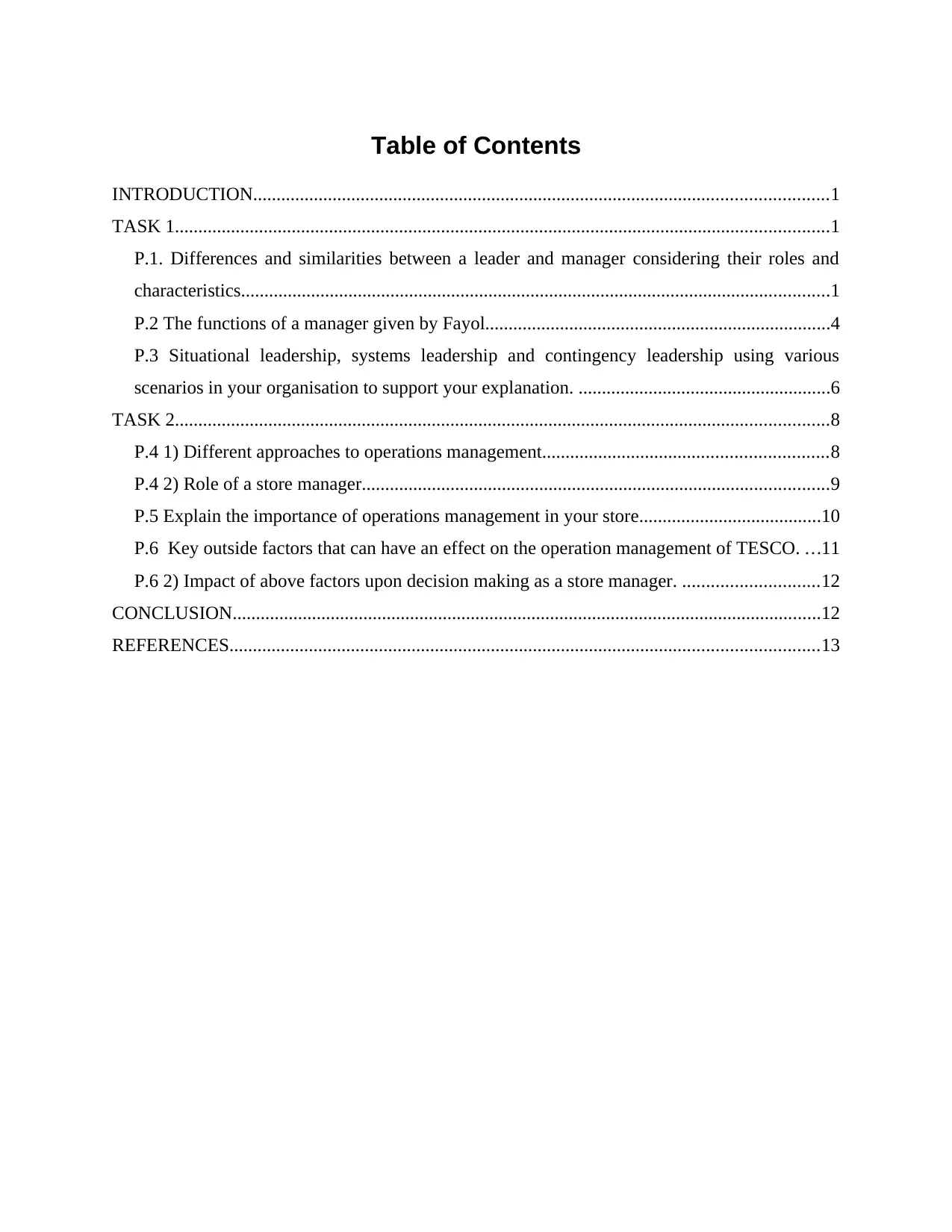
Table of Contents
INTRODUCTION...........................................................................................................................1
TASK 1............................................................................................................................................1
P.1. Differences and similarities between a leader and manager considering their roles and
characteristics..............................................................................................................................1
P.2 The functions of a manager given by Fayol..........................................................................4
P.3 Situational leadership, systems leadership and contingency leadership using various
scenarios in your organisation to support your explanation. ......................................................6
TASK 2............................................................................................................................................8
P.4 1) Different approaches to operations management.............................................................8
P.4 2) Role of a store manager....................................................................................................9
P.5 Explain the importance of operations management in your store.......................................10
P.6 Key outside factors that can have an effect on the operation management of TESCO. ...11
P.6 2) Impact of above factors upon decision making as a store manager. .............................12
CONCLUSION..............................................................................................................................12
REFERENCES..............................................................................................................................13
INTRODUCTION...........................................................................................................................1
TASK 1............................................................................................................................................1
P.1. Differences and similarities between a leader and manager considering their roles and
characteristics..............................................................................................................................1
P.2 The functions of a manager given by Fayol..........................................................................4
P.3 Situational leadership, systems leadership and contingency leadership using various
scenarios in your organisation to support your explanation. ......................................................6
TASK 2............................................................................................................................................8
P.4 1) Different approaches to operations management.............................................................8
P.4 2) Role of a store manager....................................................................................................9
P.5 Explain the importance of operations management in your store.......................................10
P.6 Key outside factors that can have an effect on the operation management of TESCO. ...11
P.6 2) Impact of above factors upon decision making as a store manager. .............................12
CONCLUSION..............................................................................................................................12
REFERENCES..............................................................................................................................13
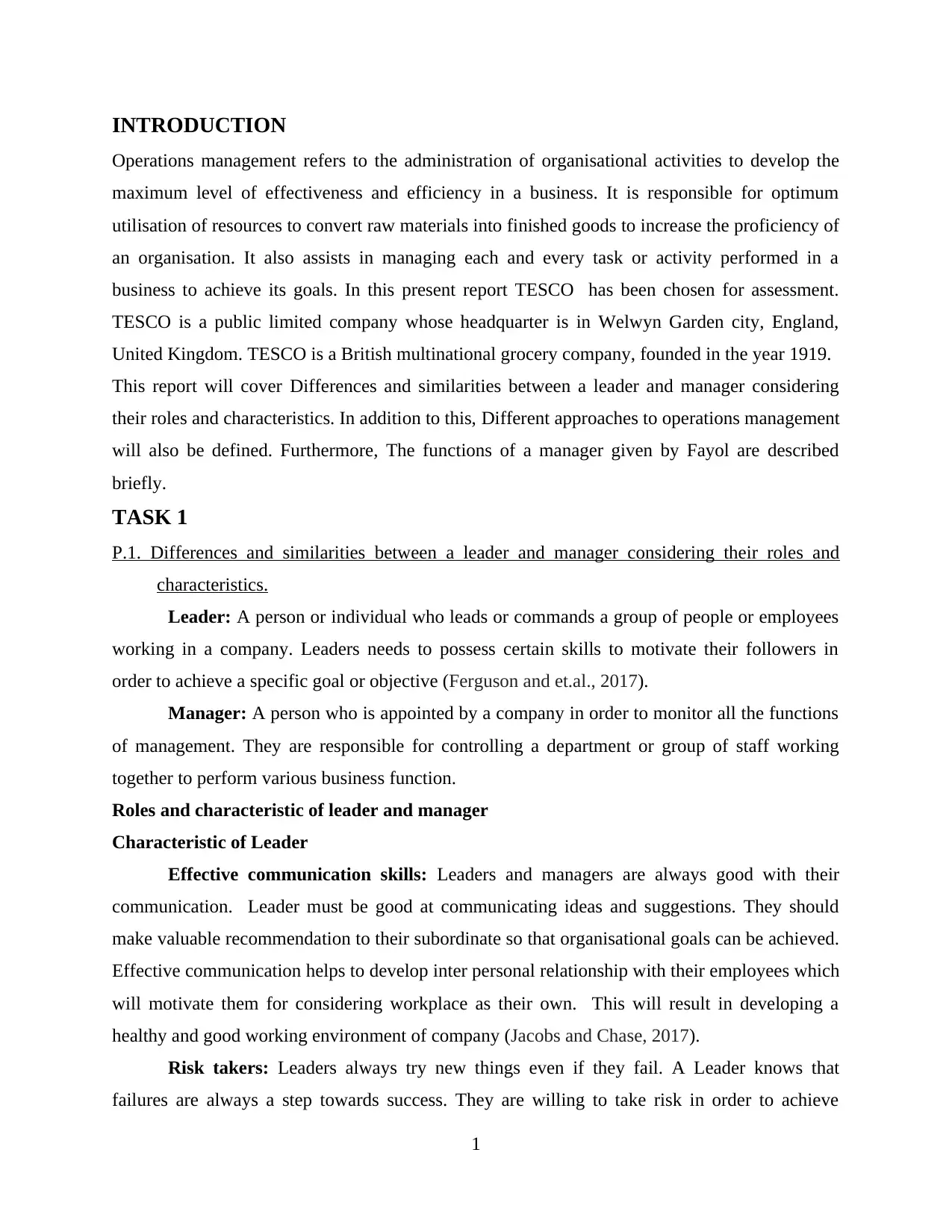
INTRODUCTION
Operations management refers to the administration of organisational activities to develop the
maximum level of effectiveness and efficiency in a business. It is responsible for optimum
utilisation of resources to convert raw materials into finished goods to increase the proficiency of
an organisation. It also assists in managing each and every task or activity performed in a
business to achieve its goals. In this present report TESCO has been chosen for assessment.
TESCO is a public limited company whose headquarter is in Welwyn Garden city, England,
United Kingdom. TESCO is a British multinational grocery company, founded in the year 1919.
This report will cover Differences and similarities between a leader and manager considering
their roles and characteristics. In addition to this, Different approaches to operations management
will also be defined. Furthermore, The functions of a manager given by Fayol are described
briefly.
TASK 1
P.1. Differences and similarities between a leader and manager considering their roles and
characteristics.
Leader: A person or individual who leads or commands a group of people or employees
working in a company. Leaders needs to possess certain skills to motivate their followers in
order to achieve a specific goal or objective (Ferguson and et.al., 2017).
Manager: A person who is appointed by a company in order to monitor all the functions
of management. They are responsible for controlling a department or group of staff working
together to perform various business function.
Roles and characteristic of leader and manager
Characteristic of Leader
Effective communication skills: Leaders and managers are always good with their
communication. Leader must be good at communicating ideas and suggestions. They should
make valuable recommendation to their subordinate so that organisational goals can be achieved.
Effective communication helps to develop inter personal relationship with their employees which
will motivate them for considering workplace as their own. This will result in developing a
healthy and good working environment of company (Jacobs and Chase, 2017).
Risk takers: Leaders always try new things even if they fail. A Leader knows that
failures are always a step towards success. They are willing to take risk in order to achieve
1
Operations management refers to the administration of organisational activities to develop the
maximum level of effectiveness and efficiency in a business. It is responsible for optimum
utilisation of resources to convert raw materials into finished goods to increase the proficiency of
an organisation. It also assists in managing each and every task or activity performed in a
business to achieve its goals. In this present report TESCO has been chosen for assessment.
TESCO is a public limited company whose headquarter is in Welwyn Garden city, England,
United Kingdom. TESCO is a British multinational grocery company, founded in the year 1919.
This report will cover Differences and similarities between a leader and manager considering
their roles and characteristics. In addition to this, Different approaches to operations management
will also be defined. Furthermore, The functions of a manager given by Fayol are described
briefly.
TASK 1
P.1. Differences and similarities between a leader and manager considering their roles and
characteristics.
Leader: A person or individual who leads or commands a group of people or employees
working in a company. Leaders needs to possess certain skills to motivate their followers in
order to achieve a specific goal or objective (Ferguson and et.al., 2017).
Manager: A person who is appointed by a company in order to monitor all the functions
of management. They are responsible for controlling a department or group of staff working
together to perform various business function.
Roles and characteristic of leader and manager
Characteristic of Leader
Effective communication skills: Leaders and managers are always good with their
communication. Leader must be good at communicating ideas and suggestions. They should
make valuable recommendation to their subordinate so that organisational goals can be achieved.
Effective communication helps to develop inter personal relationship with their employees which
will motivate them for considering workplace as their own. This will result in developing a
healthy and good working environment of company (Jacobs and Chase, 2017).
Risk takers: Leaders always try new things even if they fail. A Leader knows that
failures are always a step towards success. They are willing to take risk in order to achieve
1
⊘ This is a preview!⊘
Do you want full access?
Subscribe today to unlock all pages.

Trusted by 1+ million students worldwide
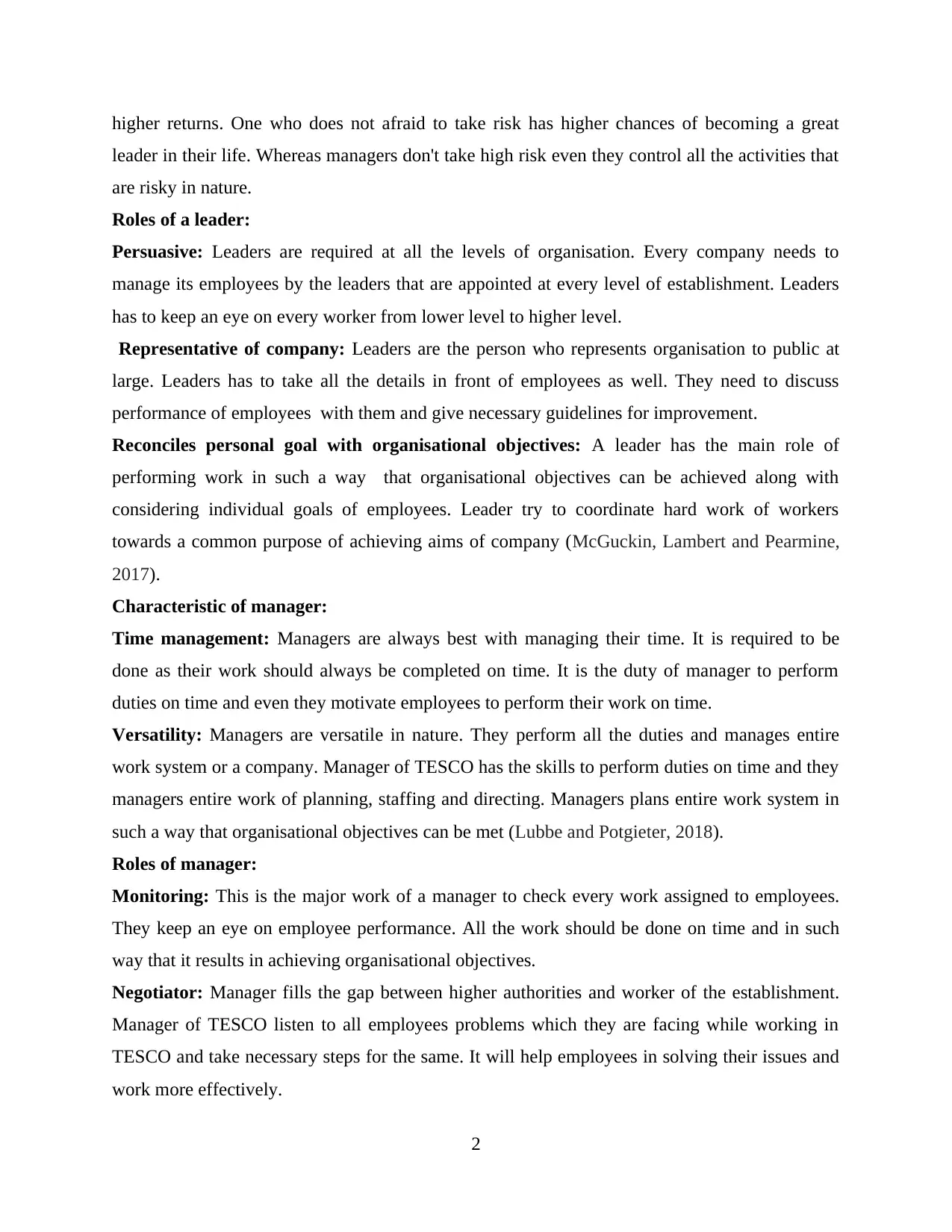
higher returns. One who does not afraid to take risk has higher chances of becoming a great
leader in their life. Whereas managers don't take high risk even they control all the activities that
are risky in nature.
Roles of a leader:
Persuasive: Leaders are required at all the levels of organisation. Every company needs to
manage its employees by the leaders that are appointed at every level of establishment. Leaders
has to keep an eye on every worker from lower level to higher level.
Representative of company: Leaders are the person who represents organisation to public at
large. Leaders has to take all the details in front of employees as well. They need to discuss
performance of employees with them and give necessary guidelines for improvement.
Reconciles personal goal with organisational objectives: A leader has the main role of
performing work in such a way that organisational objectives can be achieved along with
considering individual goals of employees. Leader try to coordinate hard work of workers
towards a common purpose of achieving aims of company (McGuckin, Lambert and Pearmine,
2017).
Characteristic of manager:
Time management: Managers are always best with managing their time. It is required to be
done as their work should always be completed on time. It is the duty of manager to perform
duties on time and even they motivate employees to perform their work on time.
Versatility: Managers are versatile in nature. They perform all the duties and manages entire
work system or a company. Manager of TESCO has the skills to perform duties on time and they
managers entire work of planning, staffing and directing. Managers plans entire work system in
such a way that organisational objectives can be met (Lubbe and Potgieter, 2018).
Roles of manager:
Monitoring: This is the major work of a manager to check every work assigned to employees.
They keep an eye on employee performance. All the work should be done on time and in such
way that it results in achieving organisational objectives.
Negotiator: Manager fills the gap between higher authorities and worker of the establishment.
Manager of TESCO listen to all employees problems which they are facing while working in
TESCO and take necessary steps for the same. It will help employees in solving their issues and
work more effectively.
2
leader in their life. Whereas managers don't take high risk even they control all the activities that
are risky in nature.
Roles of a leader:
Persuasive: Leaders are required at all the levels of organisation. Every company needs to
manage its employees by the leaders that are appointed at every level of establishment. Leaders
has to keep an eye on every worker from lower level to higher level.
Representative of company: Leaders are the person who represents organisation to public at
large. Leaders has to take all the details in front of employees as well. They need to discuss
performance of employees with them and give necessary guidelines for improvement.
Reconciles personal goal with organisational objectives: A leader has the main role of
performing work in such a way that organisational objectives can be achieved along with
considering individual goals of employees. Leader try to coordinate hard work of workers
towards a common purpose of achieving aims of company (McGuckin, Lambert and Pearmine,
2017).
Characteristic of manager:
Time management: Managers are always best with managing their time. It is required to be
done as their work should always be completed on time. It is the duty of manager to perform
duties on time and even they motivate employees to perform their work on time.
Versatility: Managers are versatile in nature. They perform all the duties and manages entire
work system or a company. Manager of TESCO has the skills to perform duties on time and they
managers entire work of planning, staffing and directing. Managers plans entire work system in
such a way that organisational objectives can be met (Lubbe and Potgieter, 2018).
Roles of manager:
Monitoring: This is the major work of a manager to check every work assigned to employees.
They keep an eye on employee performance. All the work should be done on time and in such
way that it results in achieving organisational objectives.
Negotiator: Manager fills the gap between higher authorities and worker of the establishment.
Manager of TESCO listen to all employees problems which they are facing while working in
TESCO and take necessary steps for the same. It will help employees in solving their issues and
work more effectively.
2
Paraphrase This Document
Need a fresh take? Get an instant paraphrase of this document with our AI Paraphraser
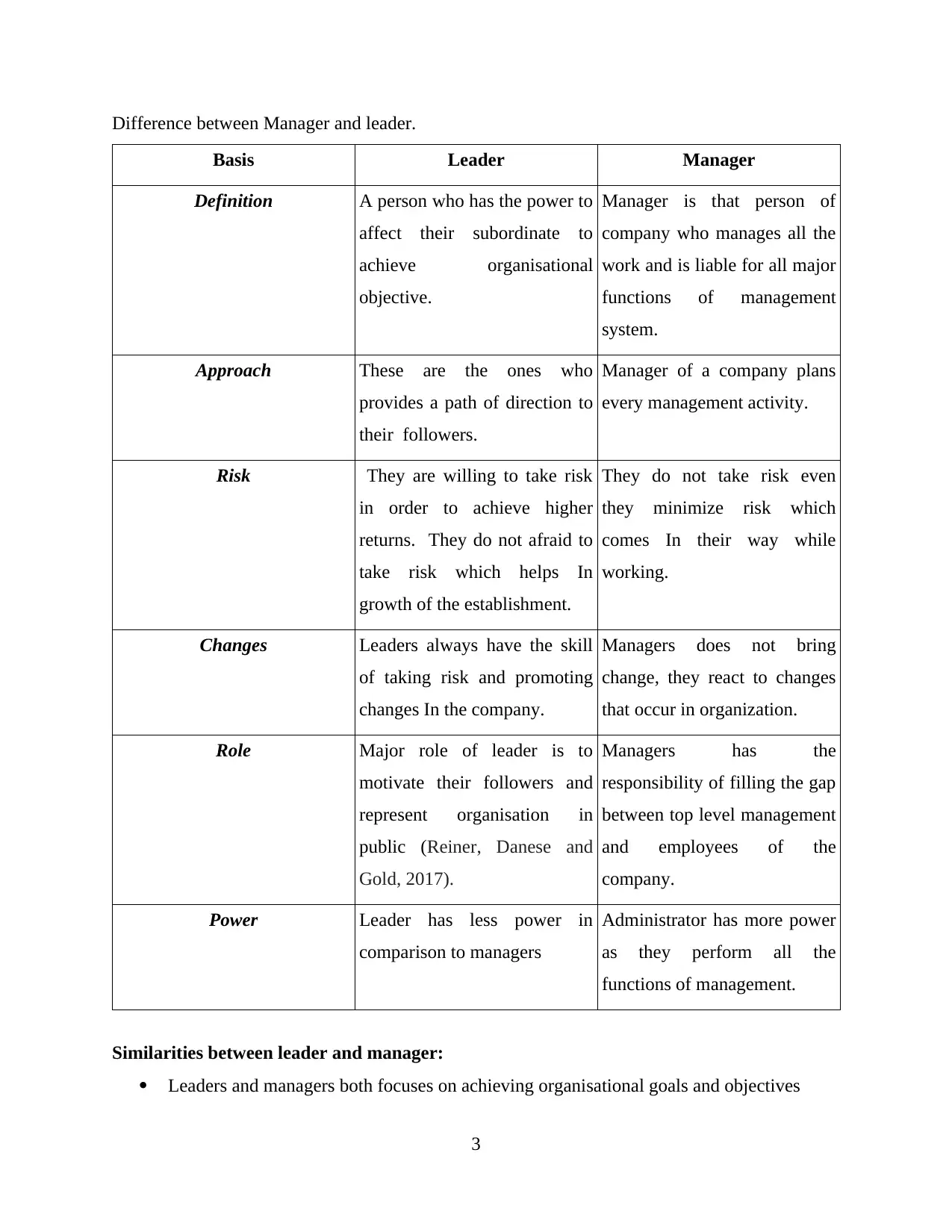
Difference between Manager and leader.
Basis Leader Manager
Definition A person who has the power to
affect their subordinate to
achieve organisational
objective.
Manager is that person of
company who manages all the
work and is liable for all major
functions of management
system.
Approach These are the ones who
provides a path of direction to
their followers.
Manager of a company plans
every management activity.
Risk They are willing to take risk
in order to achieve higher
returns. They do not afraid to
take risk which helps In
growth of the establishment.
They do not take risk even
they minimize risk which
comes In their way while
working.
Changes Leaders always have the skill
of taking risk and promoting
changes In the company.
Managers does not bring
change, they react to changes
that occur in organization.
Role Major role of leader is to
motivate their followers and
represent organisation in
public (Reiner, Danese and
Gold, 2017).
Managers has the
responsibility of filling the gap
between top level management
and employees of the
company.
Power Leader has less power in
comparison to managers
Administrator has more power
as they perform all the
functions of management.
Similarities between leader and manager:
Leaders and managers both focuses on achieving organisational goals and objectives
3
Basis Leader Manager
Definition A person who has the power to
affect their subordinate to
achieve organisational
objective.
Manager is that person of
company who manages all the
work and is liable for all major
functions of management
system.
Approach These are the ones who
provides a path of direction to
their followers.
Manager of a company plans
every management activity.
Risk They are willing to take risk
in order to achieve higher
returns. They do not afraid to
take risk which helps In
growth of the establishment.
They do not take risk even
they minimize risk which
comes In their way while
working.
Changes Leaders always have the skill
of taking risk and promoting
changes In the company.
Managers does not bring
change, they react to changes
that occur in organization.
Role Major role of leader is to
motivate their followers and
represent organisation in
public (Reiner, Danese and
Gold, 2017).
Managers has the
responsibility of filling the gap
between top level management
and employees of the
company.
Power Leader has less power in
comparison to managers
Administrator has more power
as they perform all the
functions of management.
Similarities between leader and manager:
Leaders and managers both focuses on achieving organisational goals and objectives
3
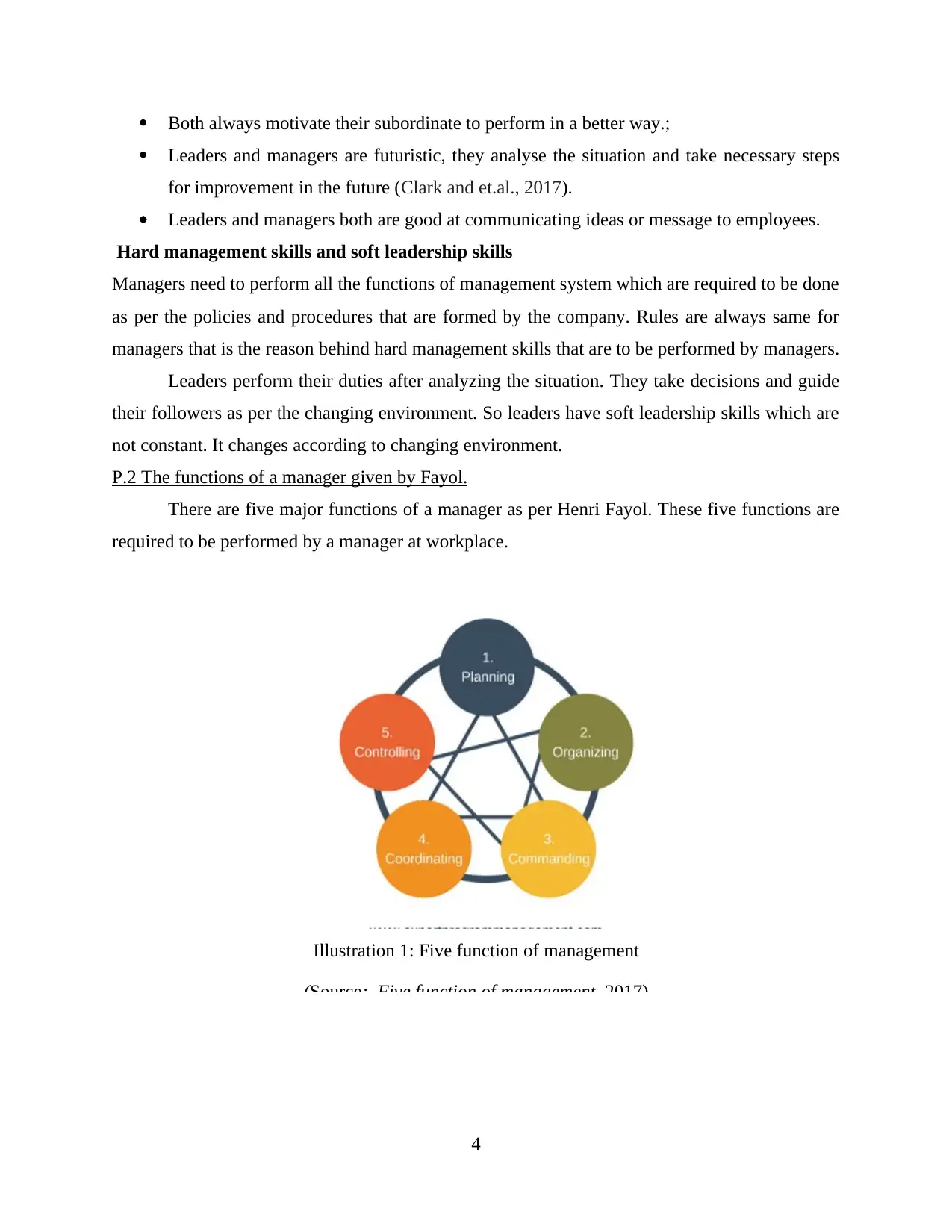
Both always motivate their subordinate to perform in a better way.;
Leaders and managers are futuristic, they analyse the situation and take necessary steps
for improvement in the future (Clark and et.al., 2017).
Leaders and managers both are good at communicating ideas or message to employees.
Hard management skills and soft leadership skills
Managers need to perform all the functions of management system which are required to be done
as per the policies and procedures that are formed by the company. Rules are always same for
managers that is the reason behind hard management skills that are to be performed by managers.
Leaders perform their duties after analyzing the situation. They take decisions and guide
their followers as per the changing environment. So leaders have soft leadership skills which are
not constant. It changes according to changing environment.
P.2 The functions of a manager given by Fayol.
There are five major functions of a manager as per Henri Fayol. These five functions are
required to be performed by a manager at workplace.
4
Illustration 1: Five function of management
(Source: Five function of management, 2017)
Leaders and managers are futuristic, they analyse the situation and take necessary steps
for improvement in the future (Clark and et.al., 2017).
Leaders and managers both are good at communicating ideas or message to employees.
Hard management skills and soft leadership skills
Managers need to perform all the functions of management system which are required to be done
as per the policies and procedures that are formed by the company. Rules are always same for
managers that is the reason behind hard management skills that are to be performed by managers.
Leaders perform their duties after analyzing the situation. They take decisions and guide
their followers as per the changing environment. So leaders have soft leadership skills which are
not constant. It changes according to changing environment.
P.2 The functions of a manager given by Fayol.
There are five major functions of a manager as per Henri Fayol. These five functions are
required to be performed by a manager at workplace.
4
Illustration 1: Five function of management
(Source: Five function of management, 2017)
⊘ This is a preview!⊘
Do you want full access?
Subscribe today to unlock all pages.

Trusted by 1+ million students worldwide
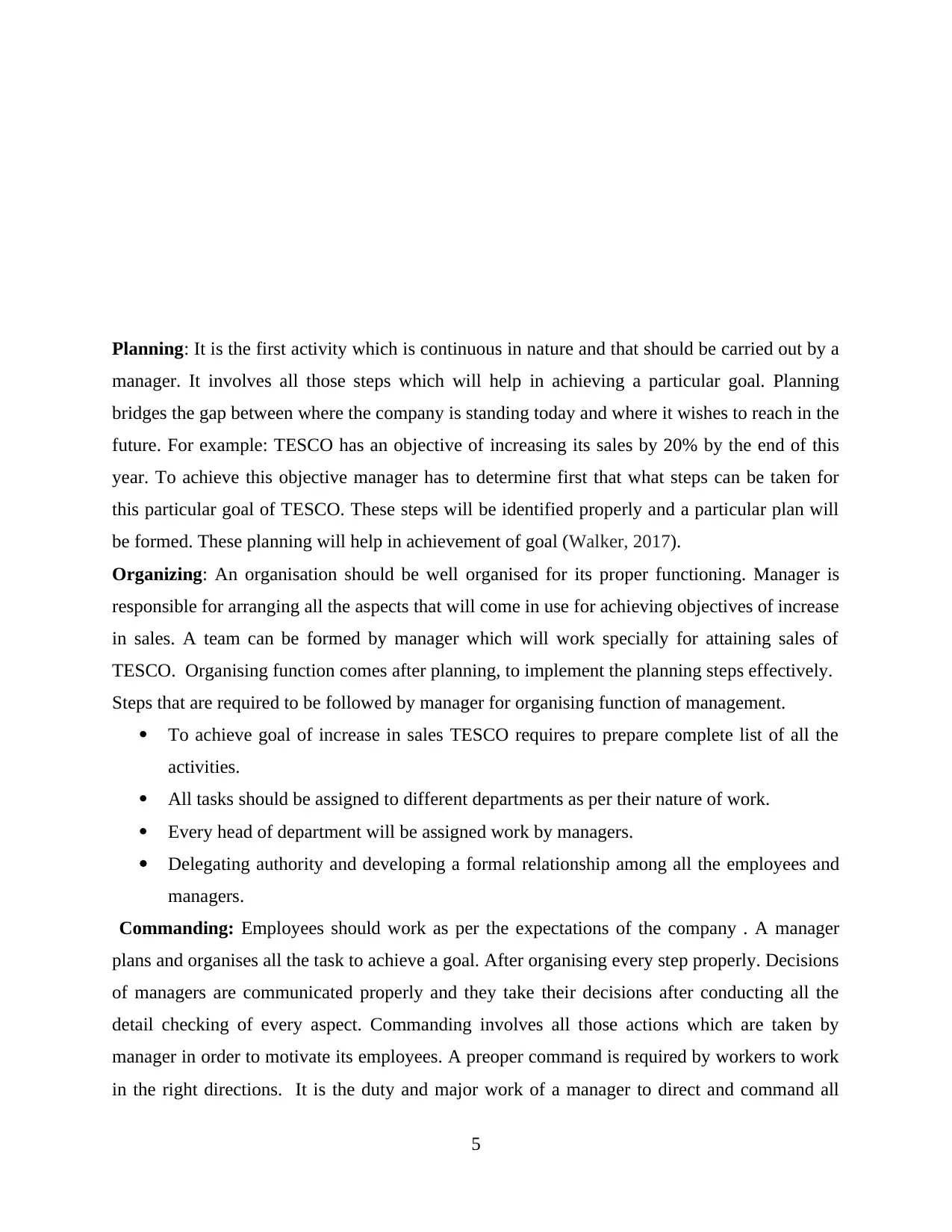
Planning: It is the first activity which is continuous in nature and that should be carried out by a
manager. It involves all those steps which will help in achieving a particular goal. Planning
bridges the gap between where the company is standing today and where it wishes to reach in the
future. For example: TESCO has an objective of increasing its sales by 20% by the end of this
year. To achieve this objective manager has to determine first that what steps can be taken for
this particular goal of TESCO. These steps will be identified properly and a particular plan will
be formed. These planning will help in achievement of goal (Walker, 2017).
Organizing: An organisation should be well organised for its proper functioning. Manager is
responsible for arranging all the aspects that will come in use for achieving objectives of increase
in sales. A team can be formed by manager which will work specially for attaining sales of
TESCO. Organising function comes after planning, to implement the planning steps effectively.
Steps that are required to be followed by manager for organising function of management.
To achieve goal of increase in sales TESCO requires to prepare complete list of all the
activities.
All tasks should be assigned to different departments as per their nature of work.
Every head of department will be assigned work by managers.
Delegating authority and developing a formal relationship among all the employees and
managers.
Commanding: Employees should work as per the expectations of the company . A manager
plans and organises all the task to achieve a goal. After organising every step properly. Decisions
of managers are communicated properly and they take their decisions after conducting all the
detail checking of every aspect. Commanding involves all those actions which are taken by
manager in order to motivate its employees. A preoper command is required by workers to work
in the right directions. It is the duty and major work of a manager to direct and command all
5
manager. It involves all those steps which will help in achieving a particular goal. Planning
bridges the gap between where the company is standing today and where it wishes to reach in the
future. For example: TESCO has an objective of increasing its sales by 20% by the end of this
year. To achieve this objective manager has to determine first that what steps can be taken for
this particular goal of TESCO. These steps will be identified properly and a particular plan will
be formed. These planning will help in achievement of goal (Walker, 2017).
Organizing: An organisation should be well organised for its proper functioning. Manager is
responsible for arranging all the aspects that will come in use for achieving objectives of increase
in sales. A team can be formed by manager which will work specially for attaining sales of
TESCO. Organising function comes after planning, to implement the planning steps effectively.
Steps that are required to be followed by manager for organising function of management.
To achieve goal of increase in sales TESCO requires to prepare complete list of all the
activities.
All tasks should be assigned to different departments as per their nature of work.
Every head of department will be assigned work by managers.
Delegating authority and developing a formal relationship among all the employees and
managers.
Commanding: Employees should work as per the expectations of the company . A manager
plans and organises all the task to achieve a goal. After organising every step properly. Decisions
of managers are communicated properly and they take their decisions after conducting all the
detail checking of every aspect. Commanding involves all those actions which are taken by
manager in order to motivate its employees. A preoper command is required by workers to work
in the right directions. It is the duty and major work of a manager to direct and command all
5
Paraphrase This Document
Need a fresh take? Get an instant paraphrase of this document with our AI Paraphraser
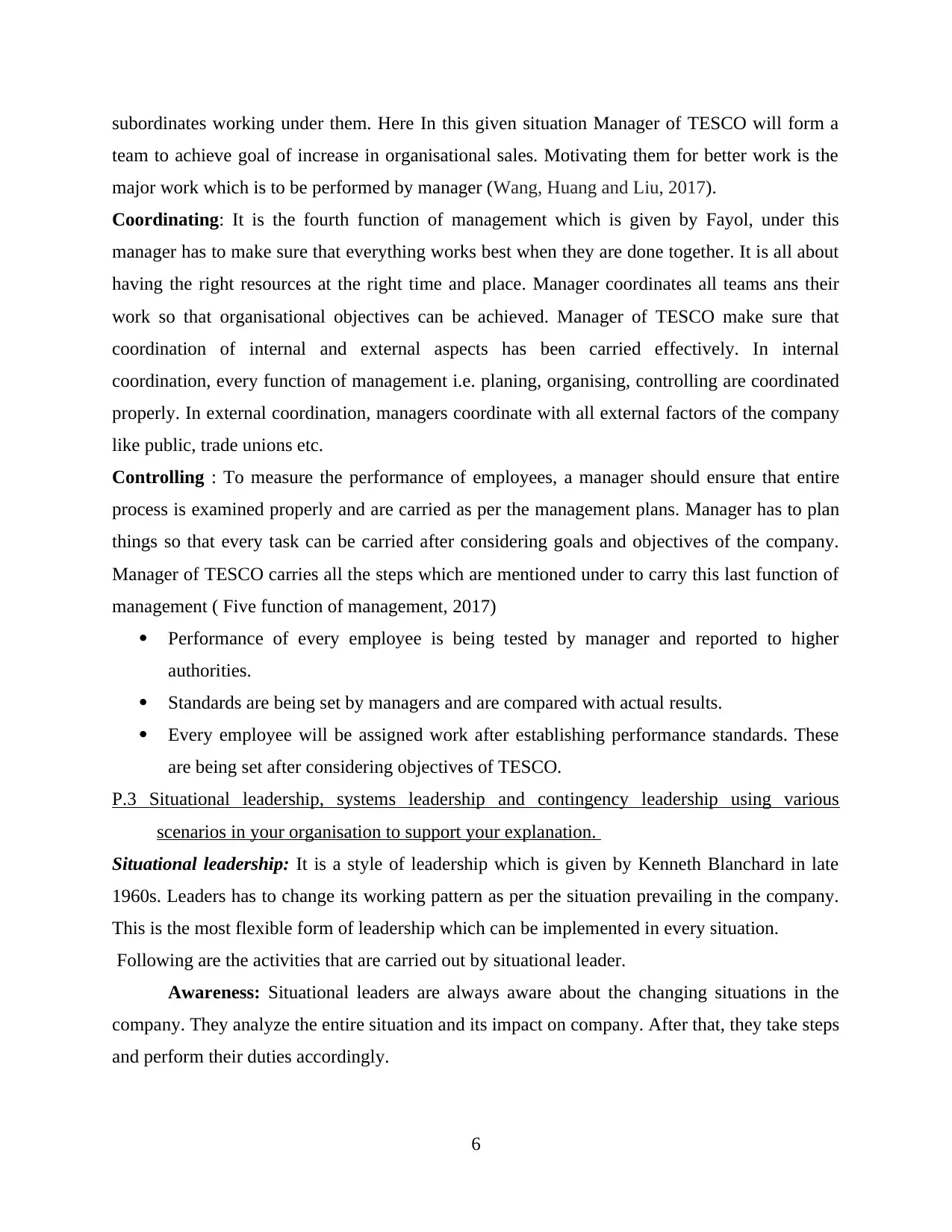
subordinates working under them. Here In this given situation Manager of TESCO will form a
team to achieve goal of increase in organisational sales. Motivating them for better work is the
major work which is to be performed by manager (Wang, Huang and Liu, 2017).
Coordinating: It is the fourth function of management which is given by Fayol, under this
manager has to make sure that everything works best when they are done together. It is all about
having the right resources at the right time and place. Manager coordinates all teams ans their
work so that organisational objectives can be achieved. Manager of TESCO make sure that
coordination of internal and external aspects has been carried effectively. In internal
coordination, every function of management i.e. planing, organising, controlling are coordinated
properly. In external coordination, managers coordinate with all external factors of the company
like public, trade unions etc.
Controlling : To measure the performance of employees, a manager should ensure that entire
process is examined properly and are carried as per the management plans. Manager has to plan
things so that every task can be carried after considering goals and objectives of the company.
Manager of TESCO carries all the steps which are mentioned under to carry this last function of
management ( Five function of management, 2017)
Performance of every employee is being tested by manager and reported to higher
authorities.
Standards are being set by managers and are compared with actual results.
Every employee will be assigned work after establishing performance standards. These
are being set after considering objectives of TESCO.
P.3 Situational leadership, systems leadership and contingency leadership using various
scenarios in your organisation to support your explanation.
Situational leadership: It is a style of leadership which is given by Kenneth Blanchard in late
1960s. Leaders has to change its working pattern as per the situation prevailing in the company.
This is the most flexible form of leadership which can be implemented in every situation.
Following are the activities that are carried out by situational leader.
Awareness: Situational leaders are always aware about the changing situations in the
company. They analyze the entire situation and its impact on company. After that, they take steps
and perform their duties accordingly.
6
team to achieve goal of increase in organisational sales. Motivating them for better work is the
major work which is to be performed by manager (Wang, Huang and Liu, 2017).
Coordinating: It is the fourth function of management which is given by Fayol, under this
manager has to make sure that everything works best when they are done together. It is all about
having the right resources at the right time and place. Manager coordinates all teams ans their
work so that organisational objectives can be achieved. Manager of TESCO make sure that
coordination of internal and external aspects has been carried effectively. In internal
coordination, every function of management i.e. planing, organising, controlling are coordinated
properly. In external coordination, managers coordinate with all external factors of the company
like public, trade unions etc.
Controlling : To measure the performance of employees, a manager should ensure that entire
process is examined properly and are carried as per the management plans. Manager has to plan
things so that every task can be carried after considering goals and objectives of the company.
Manager of TESCO carries all the steps which are mentioned under to carry this last function of
management ( Five function of management, 2017)
Performance of every employee is being tested by manager and reported to higher
authorities.
Standards are being set by managers and are compared with actual results.
Every employee will be assigned work after establishing performance standards. These
are being set after considering objectives of TESCO.
P.3 Situational leadership, systems leadership and contingency leadership using various
scenarios in your organisation to support your explanation.
Situational leadership: It is a style of leadership which is given by Kenneth Blanchard in late
1960s. Leaders has to change its working pattern as per the situation prevailing in the company.
This is the most flexible form of leadership which can be implemented in every situation.
Following are the activities that are carried out by situational leader.
Awareness: Situational leaders are always aware about the changing situations in the
company. They analyze the entire situation and its impact on company. After that, they take steps
and perform their duties accordingly.
6
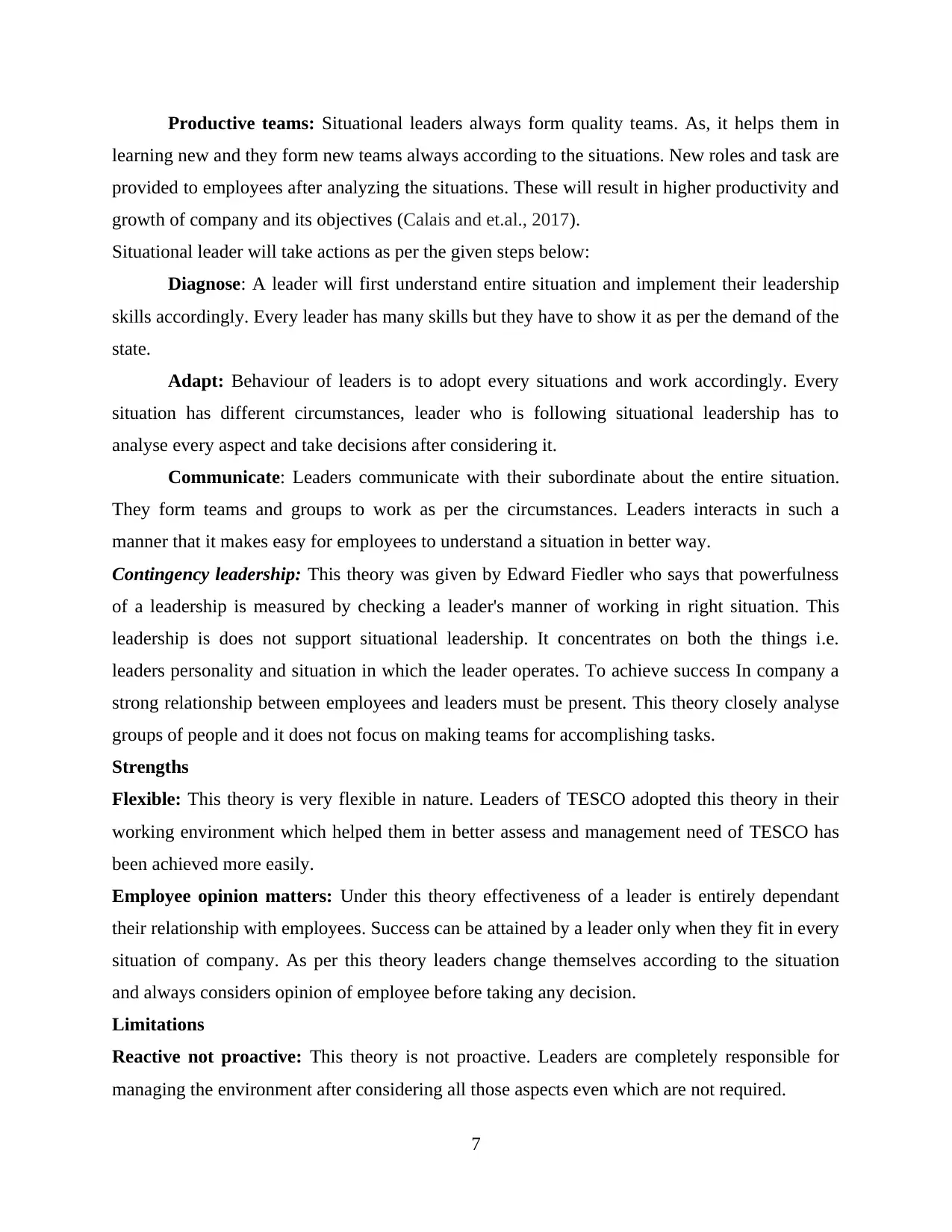
Productive teams: Situational leaders always form quality teams. As, it helps them in
learning new and they form new teams always according to the situations. New roles and task are
provided to employees after analyzing the situations. These will result in higher productivity and
growth of company and its objectives (Calais and et.al., 2017).
Situational leader will take actions as per the given steps below:
Diagnose: A leader will first understand entire situation and implement their leadership
skills accordingly. Every leader has many skills but they have to show it as per the demand of the
state.
Adapt: Behaviour of leaders is to adopt every situations and work accordingly. Every
situation has different circumstances, leader who is following situational leadership has to
analyse every aspect and take decisions after considering it.
Communicate: Leaders communicate with their subordinate about the entire situation.
They form teams and groups to work as per the circumstances. Leaders interacts in such a
manner that it makes easy for employees to understand a situation in better way.
Contingency leadership: This theory was given by Edward Fiedler who says that powerfulness
of a leadership is measured by checking a leader's manner of working in right situation. This
leadership is does not support situational leadership. It concentrates on both the things i.e.
leaders personality and situation in which the leader operates. To achieve success In company a
strong relationship between employees and leaders must be present. This theory closely analyse
groups of people and it does not focus on making teams for accomplishing tasks.
Strengths
Flexible: This theory is very flexible in nature. Leaders of TESCO adopted this theory in their
working environment which helped them in better assess and management need of TESCO has
been achieved more easily.
Employee opinion matters: Under this theory effectiveness of a leader is entirely dependant
their relationship with employees. Success can be attained by a leader only when they fit in every
situation of company. As per this theory leaders change themselves according to the situation
and always considers opinion of employee before taking any decision.
Limitations
Reactive not proactive: This theory is not proactive. Leaders are completely responsible for
managing the environment after considering all those aspects even which are not required.
7
learning new and they form new teams always according to the situations. New roles and task are
provided to employees after analyzing the situations. These will result in higher productivity and
growth of company and its objectives (Calais and et.al., 2017).
Situational leader will take actions as per the given steps below:
Diagnose: A leader will first understand entire situation and implement their leadership
skills accordingly. Every leader has many skills but they have to show it as per the demand of the
state.
Adapt: Behaviour of leaders is to adopt every situations and work accordingly. Every
situation has different circumstances, leader who is following situational leadership has to
analyse every aspect and take decisions after considering it.
Communicate: Leaders communicate with their subordinate about the entire situation.
They form teams and groups to work as per the circumstances. Leaders interacts in such a
manner that it makes easy for employees to understand a situation in better way.
Contingency leadership: This theory was given by Edward Fiedler who says that powerfulness
of a leadership is measured by checking a leader's manner of working in right situation. This
leadership is does not support situational leadership. It concentrates on both the things i.e.
leaders personality and situation in which the leader operates. To achieve success In company a
strong relationship between employees and leaders must be present. This theory closely analyse
groups of people and it does not focus on making teams for accomplishing tasks.
Strengths
Flexible: This theory is very flexible in nature. Leaders of TESCO adopted this theory in their
working environment which helped them in better assess and management need of TESCO has
been achieved more easily.
Employee opinion matters: Under this theory effectiveness of a leader is entirely dependant
their relationship with employees. Success can be attained by a leader only when they fit in every
situation of company. As per this theory leaders change themselves according to the situation
and always considers opinion of employee before taking any decision.
Limitations
Reactive not proactive: This theory is not proactive. Leaders are completely responsible for
managing the environment after considering all those aspects even which are not required.
7
⊘ This is a preview!⊘
Do you want full access?
Subscribe today to unlock all pages.

Trusted by 1+ million students worldwide
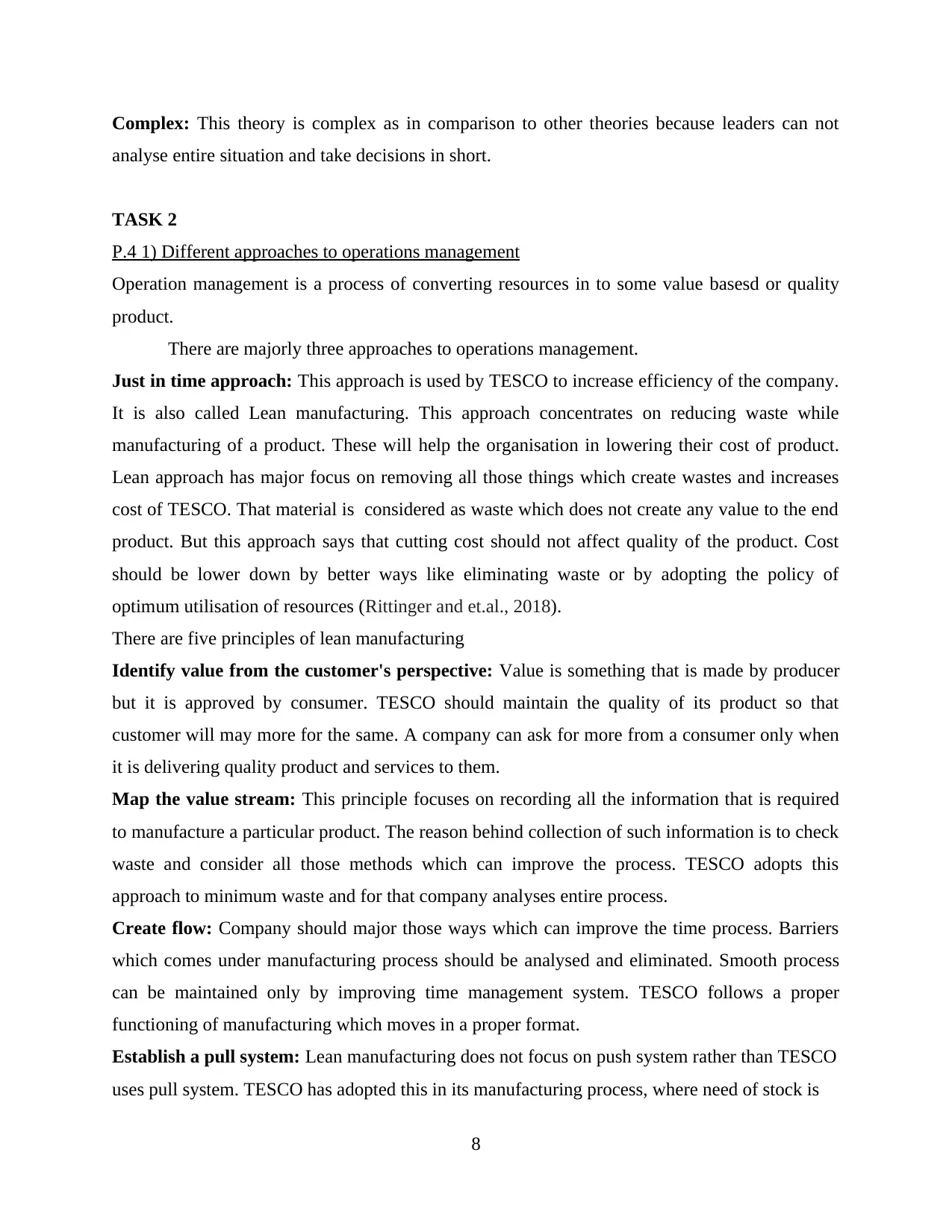
Complex: This theory is complex as in comparison to other theories because leaders can not
analyse entire situation and take decisions in short.
TASK 2
P.4 1) Different approaches to operations management
Operation management is a process of converting resources in to some value basesd or quality
product.
There are majorly three approaches to operations management.
Just in time approach: This approach is used by TESCO to increase efficiency of the company.
It is also called Lean manufacturing. This approach concentrates on reducing waste while
manufacturing of a product. These will help the organisation in lowering their cost of product.
Lean approach has major focus on removing all those things which create wastes and increases
cost of TESCO. That material is considered as waste which does not create any value to the end
product. But this approach says that cutting cost should not affect quality of the product. Cost
should be lower down by better ways like eliminating waste or by adopting the policy of
optimum utilisation of resources (Rittinger and et.al., 2018).
There are five principles of lean manufacturing
Identify value from the customer's perspective: Value is something that is made by producer
but it is approved by consumer. TESCO should maintain the quality of its product so that
customer will may more for the same. A company can ask for more from a consumer only when
it is delivering quality product and services to them.
Map the value stream: This principle focuses on recording all the information that is required
to manufacture a particular product. The reason behind collection of such information is to check
waste and consider all those methods which can improve the process. TESCO adopts this
approach to minimum waste and for that company analyses entire process.
Create flow: Company should major those ways which can improve the time process. Barriers
which comes under manufacturing process should be analysed and eliminated. Smooth process
can be maintained only by improving time management system. TESCO follows a proper
functioning of manufacturing which moves in a proper format.
Establish a pull system: Lean manufacturing does not focus on push system rather than TESCO
uses pull system. TESCO has adopted this in its manufacturing process, where need of stock is
8
analyse entire situation and take decisions in short.
TASK 2
P.4 1) Different approaches to operations management
Operation management is a process of converting resources in to some value basesd or quality
product.
There are majorly three approaches to operations management.
Just in time approach: This approach is used by TESCO to increase efficiency of the company.
It is also called Lean manufacturing. This approach concentrates on reducing waste while
manufacturing of a product. These will help the organisation in lowering their cost of product.
Lean approach has major focus on removing all those things which create wastes and increases
cost of TESCO. That material is considered as waste which does not create any value to the end
product. But this approach says that cutting cost should not affect quality of the product. Cost
should be lower down by better ways like eliminating waste or by adopting the policy of
optimum utilisation of resources (Rittinger and et.al., 2018).
There are five principles of lean manufacturing
Identify value from the customer's perspective: Value is something that is made by producer
but it is approved by consumer. TESCO should maintain the quality of its product so that
customer will may more for the same. A company can ask for more from a consumer only when
it is delivering quality product and services to them.
Map the value stream: This principle focuses on recording all the information that is required
to manufacture a particular product. The reason behind collection of such information is to check
waste and consider all those methods which can improve the process. TESCO adopts this
approach to minimum waste and for that company analyses entire process.
Create flow: Company should major those ways which can improve the time process. Barriers
which comes under manufacturing process should be analysed and eliminated. Smooth process
can be maintained only by improving time management system. TESCO follows a proper
functioning of manufacturing which moves in a proper format.
Establish a pull system: Lean manufacturing does not focus on push system rather than TESCO
uses pull system. TESCO has adopted this in its manufacturing process, where need of stock is
8
Paraphrase This Document
Need a fresh take? Get an instant paraphrase of this document with our AI Paraphraser
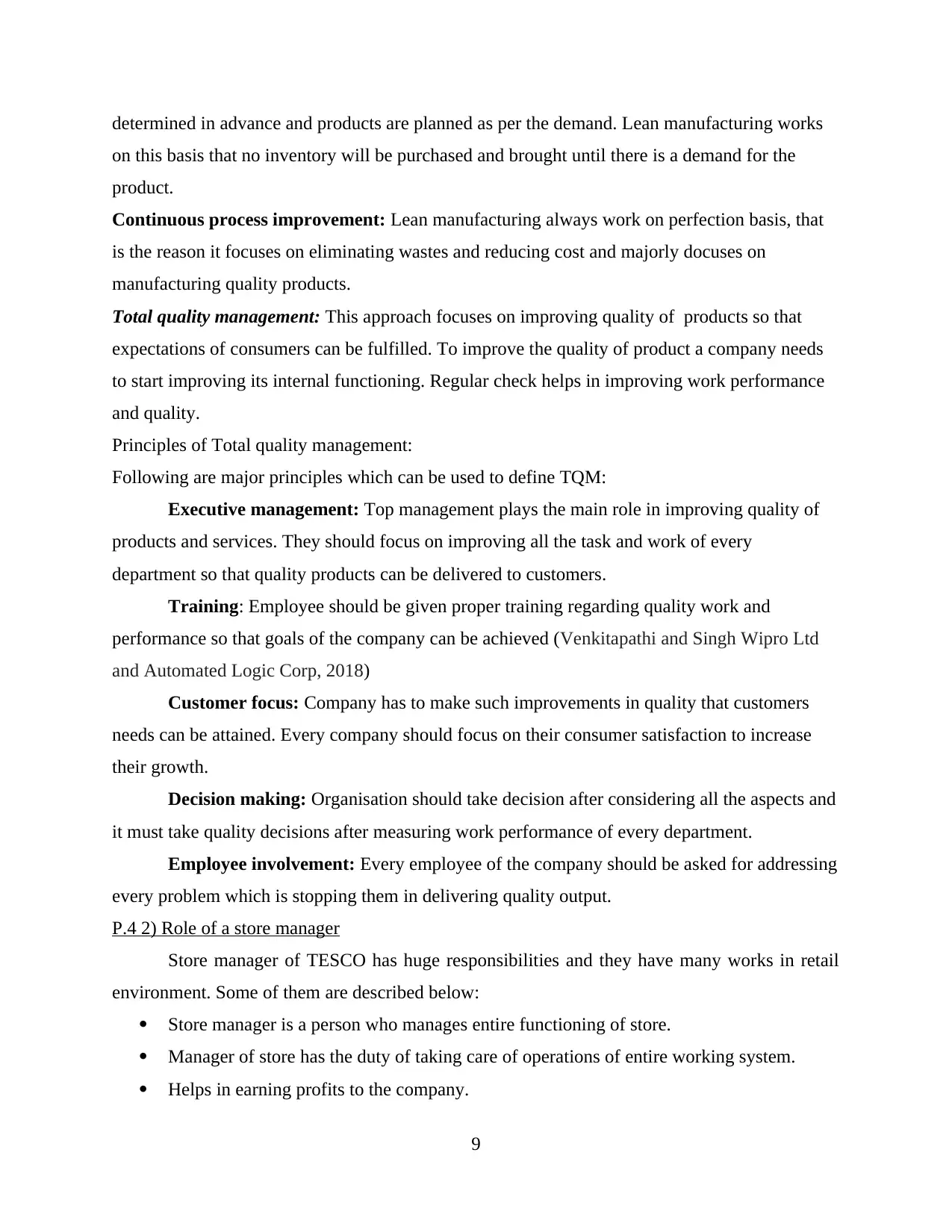
determined in advance and products are planned as per the demand. Lean manufacturing works
on this basis that no inventory will be purchased and brought until there is a demand for the
product.
Continuous process improvement: Lean manufacturing always work on perfection basis, that
is the reason it focuses on eliminating wastes and reducing cost and majorly docuses on
manufacturing quality products.
Total quality management: This approach focuses on improving quality of products so that
expectations of consumers can be fulfilled. To improve the quality of product a company needs
to start improving its internal functioning. Regular check helps in improving work performance
and quality.
Principles of Total quality management:
Following are major principles which can be used to define TQM:
Executive management: Top management plays the main role in improving quality of
products and services. They should focus on improving all the task and work of every
department so that quality products can be delivered to customers.
Training: Employee should be given proper training regarding quality work and
performance so that goals of the company can be achieved (Venkitapathi and Singh Wipro Ltd
and Automated Logic Corp, 2018)
Customer focus: Company has to make such improvements in quality that customers
needs can be attained. Every company should focus on their consumer satisfaction to increase
their growth.
Decision making: Organisation should take decision after considering all the aspects and
it must take quality decisions after measuring work performance of every department.
Employee involvement: Every employee of the company should be asked for addressing
every problem which is stopping them in delivering quality output.
P.4 2) Role of a store manager
Store manager of TESCO has huge responsibilities and they have many works in retail
environment. Some of them are described below:
Store manager is a person who manages entire functioning of store.
Manager of store has the duty of taking care of operations of entire working system.
Helps in earning profits to the company.
9
on this basis that no inventory will be purchased and brought until there is a demand for the
product.
Continuous process improvement: Lean manufacturing always work on perfection basis, that
is the reason it focuses on eliminating wastes and reducing cost and majorly docuses on
manufacturing quality products.
Total quality management: This approach focuses on improving quality of products so that
expectations of consumers can be fulfilled. To improve the quality of product a company needs
to start improving its internal functioning. Regular check helps in improving work performance
and quality.
Principles of Total quality management:
Following are major principles which can be used to define TQM:
Executive management: Top management plays the main role in improving quality of
products and services. They should focus on improving all the task and work of every
department so that quality products can be delivered to customers.
Training: Employee should be given proper training regarding quality work and
performance so that goals of the company can be achieved (Venkitapathi and Singh Wipro Ltd
and Automated Logic Corp, 2018)
Customer focus: Company has to make such improvements in quality that customers
needs can be attained. Every company should focus on their consumer satisfaction to increase
their growth.
Decision making: Organisation should take decision after considering all the aspects and
it must take quality decisions after measuring work performance of every department.
Employee involvement: Every employee of the company should be asked for addressing
every problem which is stopping them in delivering quality output.
P.4 2) Role of a store manager
Store manager of TESCO has huge responsibilities and they have many works in retail
environment. Some of them are described below:
Store manager is a person who manages entire functioning of store.
Manager of store has the duty of taking care of operations of entire working system.
Helps in earning profits to the company.
9
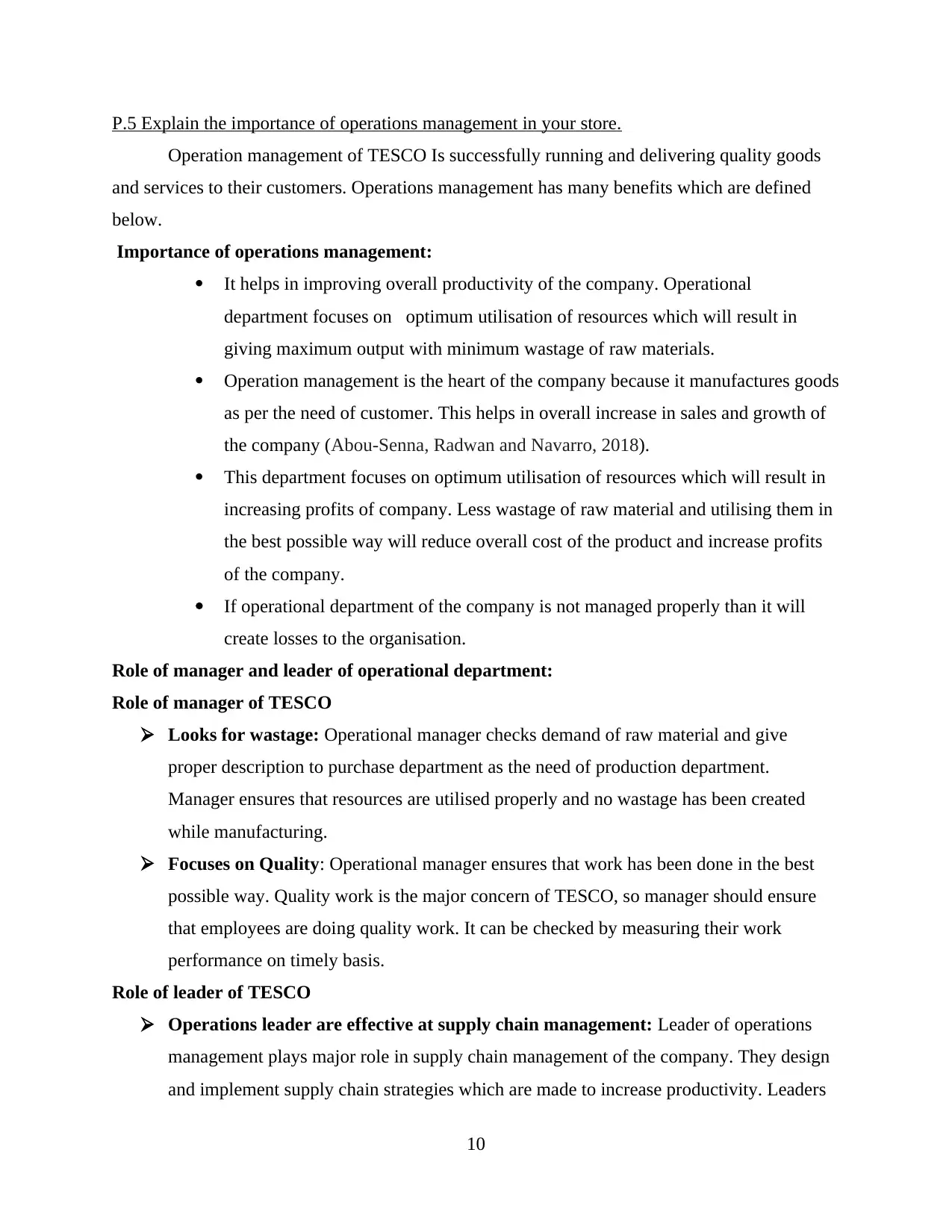
P.5 Explain the importance of operations management in your store.
Operation management of TESCO Is successfully running and delivering quality goods
and services to their customers. Operations management has many benefits which are defined
below.
Importance of operations management:
It helps in improving overall productivity of the company. Operational
department focuses on optimum utilisation of resources which will result in
giving maximum output with minimum wastage of raw materials.
Operation management is the heart of the company because it manufactures goods
as per the need of customer. This helps in overall increase in sales and growth of
the company (Abou-Senna, Radwan and Navarro, 2018).
This department focuses on optimum utilisation of resources which will result in
increasing profits of company. Less wastage of raw material and utilising them in
the best possible way will reduce overall cost of the product and increase profits
of the company.
If operational department of the company is not managed properly than it will
create losses to the organisation.
Role of manager and leader of operational department:
Role of manager of TESCO
Looks for wastage: Operational manager checks demand of raw material and give
proper description to purchase department as the need of production department.
Manager ensures that resources are utilised properly and no wastage has been created
while manufacturing.
Focuses on Quality: Operational manager ensures that work has been done in the best
possible way. Quality work is the major concern of TESCO, so manager should ensure
that employees are doing quality work. It can be checked by measuring their work
performance on timely basis.
Role of leader of TESCO
Operations leader are effective at supply chain management: Leader of operations
management plays major role in supply chain management of the company. They design
and implement supply chain strategies which are made to increase productivity. Leaders
10
Operation management of TESCO Is successfully running and delivering quality goods
and services to their customers. Operations management has many benefits which are defined
below.
Importance of operations management:
It helps in improving overall productivity of the company. Operational
department focuses on optimum utilisation of resources which will result in
giving maximum output with minimum wastage of raw materials.
Operation management is the heart of the company because it manufactures goods
as per the need of customer. This helps in overall increase in sales and growth of
the company (Abou-Senna, Radwan and Navarro, 2018).
This department focuses on optimum utilisation of resources which will result in
increasing profits of company. Less wastage of raw material and utilising them in
the best possible way will reduce overall cost of the product and increase profits
of the company.
If operational department of the company is not managed properly than it will
create losses to the organisation.
Role of manager and leader of operational department:
Role of manager of TESCO
Looks for wastage: Operational manager checks demand of raw material and give
proper description to purchase department as the need of production department.
Manager ensures that resources are utilised properly and no wastage has been created
while manufacturing.
Focuses on Quality: Operational manager ensures that work has been done in the best
possible way. Quality work is the major concern of TESCO, so manager should ensure
that employees are doing quality work. It can be checked by measuring their work
performance on timely basis.
Role of leader of TESCO
Operations leader are effective at supply chain management: Leader of operations
management plays major role in supply chain management of the company. They design
and implement supply chain strategies which are made to increase productivity. Leaders
10
⊘ This is a preview!⊘
Do you want full access?
Subscribe today to unlock all pages.

Trusted by 1+ million students worldwide
1 out of 16
Related Documents
Your All-in-One AI-Powered Toolkit for Academic Success.
+13062052269
info@desklib.com
Available 24*7 on WhatsApp / Email
![[object Object]](/_next/static/media/star-bottom.7253800d.svg)
Unlock your academic potential
Copyright © 2020–2026 A2Z Services. All Rights Reserved. Developed and managed by ZUCOL.





